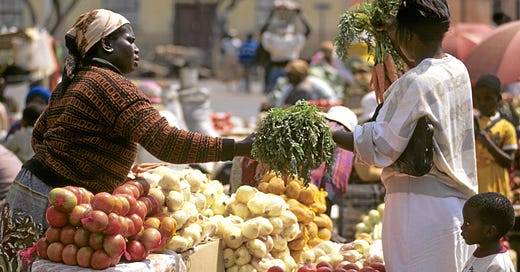Learned a lot from the piece below by Ashley Simango in Zimbabwe. -Katherine
Unlicensed Farms Shield Zimbabwe from Ukraine War-Induced Hunger
By Ashley Simango
Russia’s invasion of Ukraine has sparked what may become a “historic” global food crisis, and this has deepened pangs of hunger especially in women-led households in distressed African countries. In Zimbabwe, 6600 miles away from the battlefield, the misery of empty breakfasts and dinners was expected to come quickly after the first bomb fell.
When the war started in February 2022, key humanitarian actors like the World Food Programme warned of a secondary “war” of hunger for millions across Africa, as Ukraine, a major supplier of wheat and corn, was not able to plant her vast fields or move what harvest there was out of the Black Sea channel.
Zimbabwe, in southern Africa, which in 2019 the UN said was on the cusp of “man-made starvation,” was predicted to suffer ever more hunger as the 2022 war got underway. (Zimbabwe is also a notable recipient of U.S. food aid, having gotten $4.2 billion in food assistance from the U.S. in the last four decades.)
However, there’s an avalanche of women-managed, unlicensed household gardens and poultry pens in Zimbabwe’s city homes have helped keep devastating hunger at bay in a remarkable grassroots movement.
Rosemary Dhunda, 49, is a nurse and mother of five in Mutare, Zimbabwe’s third-largest city, and her situation fits the profile of those feared to go hungry as Russia’s bombs blocked Ukraine’s grain shipments. But she has found a means to rise above adversity, like many others.
“It’s miracle,” she tells me of the 70 egg-laying browns hens she keeps in an improvised backyard pen; the 30 white poultry hens jostling for a plate of the dry grain she doles; the 10 giant rabbits penned in a backyard garden brimming with okra, kale, tomatoes, corn, and peppers.
“We have graduated from complaining about rising global grain and wheat prices which we see on CNN TV to actually supplying small excess food. Eggs, onions, hens daily for sale in local markets,” she says.
Keeping poultry for eggs or rabbits for meat or planting cabbages in city home backyards is illegal in Zimbabwe, but recently authorities have generally turned a blind eye; there’s a silent acknowledgment that such women-led “backyard farms” have largely kept millions of households from hunger in Zimbabwe, a country with no proper currency, mostly just bond notes and U.S. dollars; and home to an astonishing 284% inflation. The majority of city homes in Zimbabwe now host rabbits, poultry hens, and all-season gardens brimming with irrigated greens, and women are the lead managers of that informal food revolution, says Tapuwa O’bren Nhachi, a social scientist and environmentalist.
“The Ukraine-Russia war bumped up the price of bread and key food items by 20% last year here in Zimbabwe, but we women didn’t panic, because we now harvest all the protein and veggies we want from home backyard food operations. Without these, children’s bellies would have gone empty,” Dhunda says.
Like Dhunda, Janet Sika, a schoolteacher and mom, is a part-time vegetable and eggs vendor in the biggest informal market in the city of Mutare.
“Unlicensed home hen pens have made Zimbabwe go opposite world trends. We heard the global price of poultry meat shot up due to grain feed being blocked in Ukraine. In Zimbabwe, because almost every city mum is raising hens in the backyard, there’s a domestic oversupply and the price of one poultry hen fell from $5 to $3,” she says, smiling.
“This is a marvelous, localized food trend that goes against the narrative,” says Pearce Moyo, food rights activist and founder of the local nonprofit Mothers in Farming Collective. She believes that this is proof that that local food solutions like raising poultry in city backyards are much stronger mechanisms in protecting households from global food price shocks or supply chains damages than previously thought. “Look at this: the U,S. and European countries assumed in 2022 that countries like Zimbabwe would suffer shortages from eggs to bread when Russia started to loot Ukraine’s grain stores – but thanks to localized efforts, in some cities in Zimbabwe there was an oversupply of produce that poultry prices has actually been halved.”
Women household food leaders in Zimbabwe like Dhunda and Sika are delighted that backyard gardens and poultry pens have led to household food security. However, food activists in Zimbabwe operate under no illusion, they say. “The law doesn’t permit residents to operate backyard poultry pens, however, it is important to legalize such backyard food operations so that they are onboarded into the tax system, banking, and statistics. We can’t continue to depend on authorities turning a blind eye,” says Moyo.
Related: Breadlines & Famines with Jeremy Bowditch
Breadlines: invented in the U.S.
Famine: always manmade, always political.
If you liked the newsletter today, please forward it to someone who’d enjoy it, and tap the heart icon above or below, which will help me reach more readers. I appreciate your help, y’all!
Please note: Smart Mouth is not accepting pitches at this time.
This newsletter is edited by Katherine Spiers, host of the podcast Smart Mouth.
A TableCakes Production.




